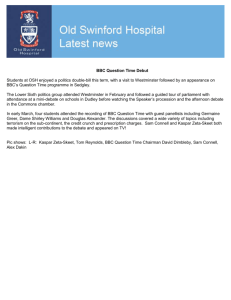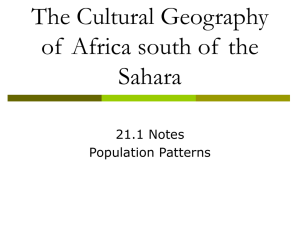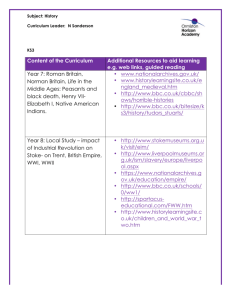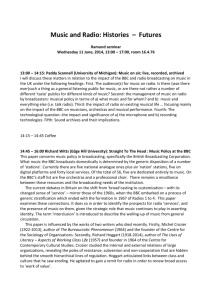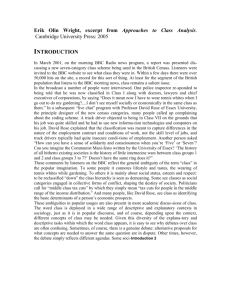Open Broadcasting Strategy Race Equality Impact Assessment
advertisement
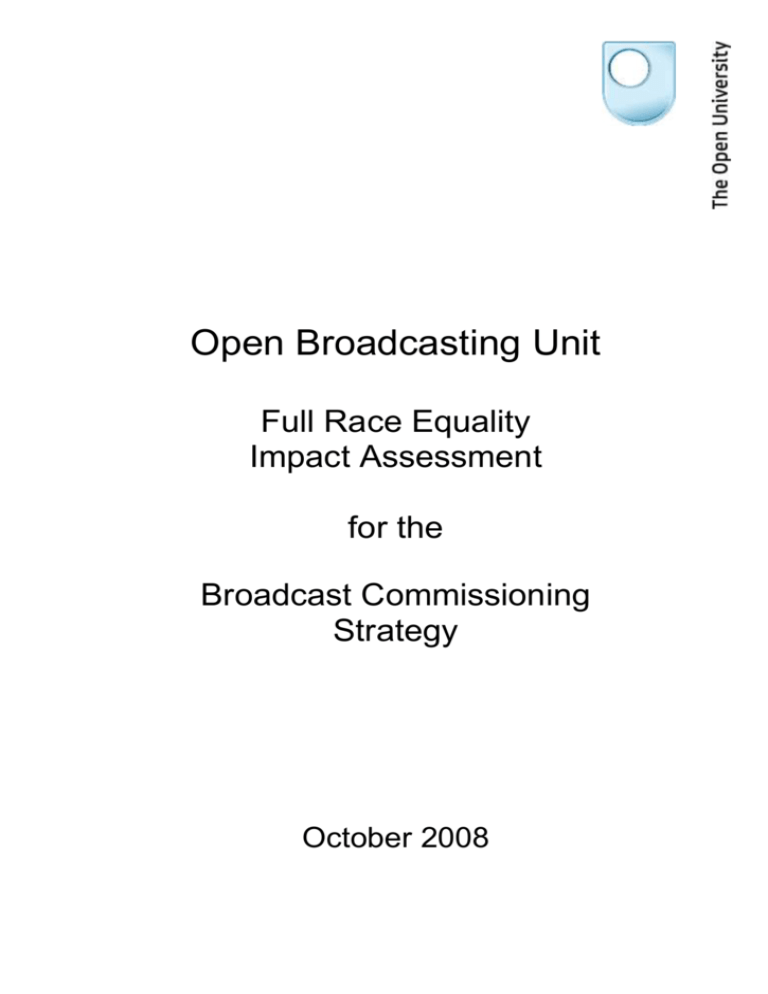
Open Broadcasting Unit Full Race Equality Impact Assessment for the Broadcast Commissioning Strategy October 2008 Contents 1. Introduction 3 2. Background to the Broadcast Commissioning Strategy 4 3. Equality Relevance 5 4. Data, Evidence and Feedback Used 4.1 External benchmarking data 4.2 Internal benchmarking data 5 5 6 5. Assessment of Impact on Race Equality 6 6. Promotion of Equality 9 7. Consideration of Alternatives 10 8. Formal Consultation 10 9. Decisions and Actions 11 10. Monitoring Arrangements 12 11. Publishing 13 12. Next Review 13 Appendix 1: Analysis of OU Series in Relation to the Ethnicity of their Viewers 14 Appendix 2: British Broadcasting Corporation Race Equality Scheme 18 We welcome feedback on this report. We are interested to know of any possible or actual adverse impact that the Broadcast Commissioning Strategy may have on any groups in respect of age, disability, gender or marital status, race, religion or belief, sexual orientation or any other distinguishing characteristics. Queries about this report or the impact of the strategy should be directed to: Liz Toone Manager, Broadcast Project (Impact) Open Broadcasting Unit Room B075 Wilson Building Walton Hall Milton Keynes MK7 6AA l.toone@open.ac.uk 2 Full Race Equality Impact Assessment for the Broadcast Commissioning Strategy, Open Broadcasting Unit, 2008 1. Introduction The University’s broadcast strategy is intended to be flexible and audience focused, with respect to the different needs of each audience segment. The partnership with the BBC and other emerging broadcast platforms is expected to take advantage of new learning technologies and new delivery methods, including digital channels and interactive and online approaches. For the purposes of this report the policy being screened is the Broadcast Commissioning Strategy and up to this point in time the strategy is wholly connected to the BBC partnership. In steering each broadcast project through from its initial proposal to its transmission on television, radio or broadband, the Open Broadcasting Unit, (OBU) strives to deliver broadcast and learning materials that will: Build public awareness of the University Widen participation in education, in particular the harder to reach audiences Help people make the transition from being a passive viewer/listener to becoming active learners The Open University has used its academic expertise to work with the BBC’s expertise in audio and visual production and create educational programmes since the charter was granted in 1969 and the first students came on board in January 1971. This has evolved more recently into the commissioning of peak time programmes for BBC1, BBC2 and BBC4 along with Radio 3 and Radio 4. Every TV, radio and broadband programme is supported by learning materials on the BBC/OU website (Open2.net) which meets strict BBC editorial guidelines and is regularly assessed to meet OU, BBC and industry accessibility standards. On occasion the OU also offers free printed learning materials to further engage the audience. These are not available for all programmes, are not reprinted once stocks run out (unless the programme is still transmitting) and therefore only provide a limited proportion of observable data on broadcast related enquiries to the OU. Via the 5th Agreement the OU has access to the BBC television and sound archives where material can be used by Open University course teams and commissioned programme makers. The BBC's commitment The BBC is committed to reflecting the diversity of the UK audience in its workforce, as well as in its output on TV, on radio and online. It aims to reflect the population of modern Britain - through gender, age, ethnicity and cultural diversity, disability, faith and social background, and sexual orientation. The BBC is a member of the major industry networks on disability and ethnicity, as well as of the main UK employer forums which bring together organisations committed to driving progress on diversity. 3 Full Race Equality Impact Assessment for the Broadcast Commissioning Strategy, Open Broadcasting Unit, 2008 2. Background to the Broadcast Commissioning Strategy The Broadcast Commissioning Strategy provides a strategy and plan for decisions on the commissioning of TV and Radio programmes for broadcast on BBC channels and other broadband platforms. It identifies a range of targets and other factors which influence commissioning decisions over programmes, content of programmes, channels, timings and subsequent usage of content. Purpose and direction of the Open Broadcasting Unit The OBU manages the University's relationship with the BBC and its broadcast projects including web and print related elements. These projects increase OU brand awareness in the UK and internationally via the sale of OU commissioned programmes to a worldwide audience and promote knowledge transfer and public awareness of learning opportunities. The Unit also contributes to a number of University strategies. It is important to note that a Broadcast Strategy Review has been underway during 2007 and it is likely that the final outcomes will affect the way ‘broadcasting’ is delivered and will require the unit to revise plans and expectations. The final outcomes of this review are beginning to emerge as this report is being finalised. Why the relationship with the BBC? The relationship with the BBC provides the best means of reaching large numbers of people and meets the OU’s Charter obligation ‘to promote the educational well-being of the community generally and to do so by a diversity of means including broadcasting’. The future of broadcasting The work of the OBU is very heavily focussed on the BBC relationship. It has been agreed that the 5th Agreement between the OU and the BBC will be extended to 2011. The BBC itself faces challenges and is changing in order to meet them. Restructuring in the BBC, developments in broadcasting and associated technologies, government initiatives and an increasing emphasis on the need to work in partnership all have an influence on OBU activities and plans. Measuring progress To support the institution’s need for students the OBU analyses audience share, audience demographics and brand awareness of each broadcast series and with OU Marketing, monitors the patterns of registration and retention behaviour from broadcastled enquiries. Since August 2007 the unit has also made use of a website analytics package, to analyse web traffic into, through and out of Open2.net web pages and into OU sites, particularly for on-line print/prospectus requests and resultant registrations. It is important to note that registrations following broadcasts can only be monitored if a print item was available for the series and that resultant registrations typically take place up to 2 years after the initial enquiry for the broadcast print item. 4 Full Race Equality Impact Assessment for the Broadcast Commissioning Strategy, Open Broadcasting Unit, 2008 3. Equality relevance The policy is considered to be highly equality relevant and this reflects the decision that was made resulting from the race equality screening exercise completed in 2005/06. The OU Broadcast Strategy and Commission Plan for 2005 – 2010 formal written policy sets out: “To contribute to the University’s widening participation strategy. It is vital to our core purpose that we continue actively to encourage and support the successful participation of all those who wish to take up opportunities for higher education, especially those from disadvantaged backgrounds or from under-represented groups. Black and ethnic minority students Students from low socio-economic groups Disabled students Students from isolated or rural areas Programmes commissioned and presenters used need to acknowledge and reflect social diversity.” The Broadcast Strategy Review, concluded that current broadcast activities do not enable us to target specific communities, particularly the harder to reach ones. This, coupled with the demographic structure of the BBC audiences represents an area that needs to evolve to meet the public engagement mission. This means evolving broadcasting to target and support specific learning communities in a more focussed way. This will, however, reduce the general reach of broadcasting activity. 4. Data, Evidence and Feedback Used Historically, no systematic evaluation of the impact of Broadcasting on different ethnic groups has taken place. Audience demographics, including ethnicity, are measured following each OU/BBC series but current OU management information systems do not support the collection and monitoring of subsequent enquiries or registrations resulting from broadcasting. It is considered unreasonable to collect ethnicity or other information of this nature at point of enquiry, because the enquirer may just be requesting information and have not reached the decision to enter into a relationship with the University at this point – therefore it is not proportionate to our duty to promote equality to do this. To assess the impact of the Broadcast Commissioning Strategy a number of sources were used. 4.1 External benchmarking data The BBC Marketing Communications & Audiences (MC&A) division regularly produce various lifestyle reports on ethic minority audiences. The reports focus on how lifestyle influences use of television, radio and new media and are available on the intranet for productions houses to consider when commissioning programmes. This information is not in the public domain, but available to the University via the partnership. 5 Full Race Equality Impact Assessment for the Broadcast Commissioning Strategy, Open Broadcasting Unit, 2008 Omnibus Research TNS Global, (Taylor Nelson Sofres) TNS Global conduct omnibus surveys for the University by commissioning face-to-face surveys with large sample sizes of around two to three thousand people per series. Ethnicity is recorded within the survey results. Audience Response Reports – Broadcast Audience Response Board (BARB) All peak-time audience figures are researched to help deepen our understanding of audience behaviours and feed into the Broadcast Commissioning Strategy process. 4.2 Internal benchmarking data Enquiry Generation Data (CIRCE ) The OBU monitors the number of enquiries that have approached the Open University for a print item relating to the OU/BBC programmes. Not all programmes are supported with print items and to date (Aug 08) enquirers have not been given the option to ‘opt-in’ to the University. 5. Assessment of Impact Stage One For the first stage of the impact assessment the OBU analysed its audience demographic data against the national statistics 1from the Census 2001 that shows that 7.9% of the UK population was from a black and ethnic minority group. Open University broadcasts currently average 4.7% (2006/7). Differences in relation to individual series can be seen in the extended piece of research conducted on a sample of 32 OU peak-time programmes where ethnicity of respondents was recorded during the survey process. See Appendix 1 on p13 The key findings from the research revealed: • Over the 4 years we have collected data on ethnic origin for OU series: on average 4.7% of viewers to OU series are drawn from black and ethnic minority groups. • Greater differences exist in relation to the series subject. Often, however, only one series has been broadcast on any subject and this makes it difficult to draw conclusions with any certainty. Compared to the OU’s average reach of 4.7% amongst those from black and ethnic minority groups, Ever Wondered About Food Series 4 attracted 9.3% and Sport Relief Goes All Out For India attracted 8.0%. The two series of The Money Programme averaged 5.9%. • Due to the audience size for BBC1 programmes, this channel has the highest proportion of viewers from minority ethnic groups. The unit also analysed the BBC Viewer/Listener complaints service which revealed that there has been no reported correspondence of a racial nature during the last 5 years regarding OU peak time programmes. 1 National Statistics are published online at http://www.statistics.gov.uk/. 6 Full Race Equality Impact Assessment for the Broadcast Commissioning Strategy, Open Broadcasting Unit, 2008 Questions were drawn up to establish the OBU’s current position re Race Equality and broadcasting. 1. 2. 3. 4. 5. Are we producing print on programmes likely to attract a diverse audience? Are the programmes reaching a diverse audience? Are we satisfied that contractors are legally compliant? Are presenters and programmes participants sufficiently diverse? What proportion of students from ethnic minorities register for a course after seeing a broadcast? Monitoring Data 1. Are we producing print on programmes likely to attract a diverse audience? 2007 data currently being generated by AACS systems for analysis in second half of 2008. 2. Are the programmes reaching a diverse audience? Viewer demographics were checked using Omnibus Research data by series. Samples of two to three thousand adults are asked seven questions about OU/BBC programmes following transmission and the interviewer (since start of 2007) also provides the demographic profile and ethnic make-up of those who watched any programmes in the series. Data is fed back to the OBU on a half yearly basis and targets are measured annually against the Unit Business Plan. 3. Are we satisfied that contractors are legally compliant? The BBC’s broader diversity strategy2 reflects the core principles that serve the diverse communities which it endeavours to reach. There is a clear understanding that, in order for programmes to have wide appeal, the creative teams themselves must be representative of a broad range of ethnic, cultural, religious and regional backgrounds (as well as reflecting other communities of interest). 4. Are presenters and programmes participants sufficiently diverse? Presenters are employed according to BBC Equal Opportunity Policy3. 5. What proportion of students from ethnic minorities register for a course after seeing a broadcast? Student Services will provide annual data using the Mosaic Profiling system. The first analysis will be conducted in the second half of 2008. It is not compulsory to answer a question on ethnicity at the point of enquiry to the OU for print material related to an OU/BBC broadcast and only a small proportion of enquirers to the OU answer this question. Stage Two The second stage of the impact assessment looked at one BBC/OU series, Child of Our Time, because the series long running history provided us with data over an extended period. Information about the BBC’s commitment to diversity is published online at http://www.bbc.co.uk/info/policies/diversity.shtml#commitments. 3 Information about the BBC’s Equal Opportunities policy is published online at http://www.bbc.co.uk/info/policies/diversity.shtml#equal. 2 7 Full Race Equality Impact Assessment for the Broadcast Commissioning Strategy, Open Broadcasting Unit, 2008 Average Ethnic Make-up of Enquiries and Students resulting from OU Programmes. As very little data is collected at point of requesting a brochure/leaflet, it is virtually impossible to find an accurate measure of ethnic origin. However, we were able to establish that of 95,000 respondents for the print item, only 6% of respondents left details about their ethnic origin. At the stage of reserving a course it was found that approximately 53% of respondents left details about their ethnic origin (of which 83% were in one category). This highlights the difficulty in determining student numbers by ethnic origin resulting from BBC/OU programming via current student records. A more reliable measure would be to monitor registrations arising from enquiries (where ethnicity data is more complete) and comparing these to the Census population data. The Ward Deprivation Index will be used in the second half of 2008 to establish if this method of data collection provides more robust results. The OU has carried out its own mapping analysis which shows that there is a high correlation between the locations of the lower quintiles in the Index of Multiple Deprivation in England and the locations where ethnic minority people are most likely to live. This is linked to the higher likelihood of ethnic minority people living in urban rather than rural areas. Therefore we are using the IMD as a proxy indicator, but we recognise that this is far from adequate and any findings will need to be interpreted with caution. The following data will serve as a preliminary benchmark: 15% of respondents requesting print items came from the low bands in the Deprivation Index and 16% of respondents that subsequently went on to reserve a course came from the same band. Currently OU programmes show that 40% of respondents are drawn from 0 to 50% in the Deprivation Index and 60% drawn from the higher end of the Index. (0-25% bands match OU Widening Participation areas) Stage Three The third stage of the impact assessment looked at the specific demographics of the platforms used to broadcast OU commissioned series. BBC Television Profile BBC ONE has the highest reach to ethnic minorities both in all hours and peak hours, followed by ITV1. BBC TWO has a higher reach than Channel 4, FIVE or cable and satellite due to volume. BBC ONE is voted to be the channel which represents ethnic minorities the best by all audiences (source MC&A - ethnic minority project, Ipsos-UK, BBC Marketing Communications, Strategy & Distribution, April 2003). BBC Radio Profile Overall radio appeals slightly less to Black listeners – this is driven by the lower than average approval to BBC local radio, especially when compared with commercial local radio. BBC National radio has high approval, particularly amongst Asian listeners. However, ethnic minority audiences prefer local commercial stations – the weekly reach to all independent local radio is far higher than to BBC local or regional radio. Many of the commercial radio stations, even the mainstream stations such as 95.8 Capital FM over-perform amongst ethnic minorities. Both Black and Asian adults are less likely to listen to the radio during the day compared to White adults and more likely to listen in the evening. 62% of Black and Asian adults have no contact with BBC Network Radio, rising to over 70% in London; Radio 1 attracts the highest numbers, over half a million Black and Asian people. (Source Rajar/IPSOS-RSL Q4 02 - based on 12 months). 8 Full Race Equality Impact Assessment for the Broadcast Commissioning Strategy, Open Broadcasting Unit, 2008 5.4 Stage Four The fourth stage of the impact assessment looked at the risks around failure to effectively meet the diverse needs of the various communities that the institution is trying to serve. Internal Risks The most significant internal risk facing the Unit is around the failure to effectively meet the diverse needs of the various communities in the institution, supporting recruitment from target groups, supporting the teaching and learning strategy and delivering commercially attractive materials, (source OBU Risk Register). External Risks The major external risks lie around the need to develop the broadcast strategy and take advantage of new opportunities (e.g. around emerging technologies and use of new technologies) without losing the current benefits of the BBC partnership. The current Broadcast Strategy Review is considering this area. 6. Promotion of Equality The relationship with the BBC provides the best means of reaching large numbers of people and meets the OU’s Charter obligation ‘to promote the educational well-being of the community generally and to do so by a diversity of means including broadcasting’. As the broadcast commissioning process develops to include new technology and multiplatform delivery then a more targeted approach may be possible to include all population demographics including ethnicity. The BBC, the OU’s main partner in the Broadcast Commissioning Strategy, has its own Race Equality Scheme (RES)4 that forms a part of the BBC's overall commitment to equality and diversity. It outlines a framework for how the BBC, in relation to its public functions, will now develop, implement, monitor and review its work towards achieving equality for people who belong to different ethnic and/or cultural groups. (See Appendix 2 for a foreword by BBC Chairman Sir Michael Lyons p17) The BBC Charter Obligation The BBC will, when planning or developing future access services, consider the potentially differing impact or needs requirements of people from diverse ethnic and cultural backgrounds. Cultural Diversity Network The BBC is a member of the Cultural Diversity Network (CDN)5 alongside Sky, Five, Channel 4, GMTV, SMG, ITN, ITV and Pact. CDN is a network of broadcasters promoting cultural diversity both on and off screen. The network aims to facilitate real change and to liaise with both talent and decision makers to keep diversity at the top of the agenda. 4 The BBC Race Equality Scheme is published online at http://www.bbc.co.uk/info/policies/diversity.shtml#schemes. 5 For more information about CDN visit their website at http://www.culturaldiversitynetwork.co.uk/. 9 Full Race Equality Impact Assessment for the Broadcast Commissioning Strategy, Open Broadcasting Unit, 2008 The Radio Industry Diversity Group The BBC was instrumental, with BECTU6, in setting up the Radio Industry Diversity Group in December 2006. This is the first such group in the radio industry and it covers all aspects of diversity ranging from race to disability. The BBC also has its own internal Radio Diversity Group. The BBC Trust The Trust works to make sure that people from a wide range of cultural and ethnic communities and the many different groups that make up those communities are listened to and heard. It must make sure that it engages with the widest possible audiences and in the ways that best suit them. The BBC is committed to the principle of ‘race equality’ in relation to all its activities and in respect of its public functions in particular, and the Trust will continue to consult the public in order to maintain and review this work. 7. Consideration of Alternatives The possibilities where adverse impacts are identified are; a) Do not have a policy b) Change the policy in some way c) Keep it as it is, but have some mitigating actions to compensate – the Broadcast Commissioning Strategy is an organic strategy that is continually evolving following audience and university priorities 8. Formal Consultation Consultation between the OBU and the following took place to aid the publication of this report: With the UK general public via TNS Omnibus surveys following transmissions of each OU series. Analysis of BBC viewer/listener enquiries and complaints Viewing habits from the Broadcast Audience Research Board. BARB provides inhome TV viewing measurement for the UK. This is obtained from a panel of 5,100 homes. The panel design is representative of the whole of the UK and people are recruited from all sectors of the population. With additional data from: BBC Marketing & Sales, Campaign Planning & Data for information on viewer/listener responses to OU/BBC broadcasts. 6 Broadcasting Entertainment Cinematograph and Theatre Union is the independent union for those working in broadcasting, film, theatre, entertainment, leisure, interactive media and allied areas, for more information see http://www.bectu.org.uk/. 10 Full Race Equality Impact Assessment for the Broadcast Commissioning Strategy, Open Broadcasting Unit, 2008 The BBC Diversity Centre highlighted relevant research ‘Connecting with Ethnic Minority Audiences’ which was conducted in 2003. Networks have been set up along side other broadcast companies which aim to facilitate real change to liaise with both talent and decision makers to keep diversity top of the agenda. The BBC's Race Equality Scheme (RES) Published 12 June 2007, outlines a framework for how the BBC will develop, implement, monitor and review its work towards achieving equality for people from diverse ethnic and/or cultural backgrounds. It includes: a. an overview of the constitutional position of the BBC b. a detailed explanation of the key elements which make up the scheme c. action plans for the first year of the scheme for each of the public functions d. a list of the public functions of the BBC The BBC Race Equality Scheme is now available at: http://www.bbc.co.uk/info/policies/ Between May and August of 2007 the BBC Trust will be publicly consulting on how it should engage with its diverse audiences, with particular effort to ensure that those communities which are traditionally hardest to reach are properly included. This will ensure that the part of the OU Broadcast Commissioning Strategy that relates to programmes on the BBC will be able to take advantage of the BBC’s own plans to reach as diverse an audience as possible. 9. Decisions and Actions There are some moves to change the policy now following the Broadcast Strategy Review with the likelihood that we will be able to broadcast to smaller markets using new technologies such as YouTube and itunesU – this has huge potential for the promotion of equality and reaching targeted sections of the market. A set of monitoring arrangements have been put in place that measure the audience profile of OU broadcasting activities. During 2008 this data will be analysed to gain a greater understanding of the demographics of the broadcasting audience that contacts the OU. Working with OU Marketing, data sets for 2005, 2006 and 2007 will be analysed and where possible benchmarks drawn up for target setting in 2008 and 2009. 11 Full Race Equality Impact Assessment for the Broadcast Commissioning Strategy, Open Broadcasting Unit, 2008 10. Monitoring Arrangements This data will be analysed by the OBU with input from OU Marketing, BBC Marketing and audience research data. Where any adverse impact is found, this will be reported unit wide and remedial action will be noted within the OBU Unit Plan. Questions Monitoring arrangements Are we producing print on programmes likely to attract a diverse audience? Check profile of respondents requesting print resulting from broadcasts using Mosaic Profile System Timescale: 6 monthly basis starting 2008. Omnibus demographics research BBC1/2 –profiled by ethnic origin per series. Timescale: 6 monthly basis. Systems to monitor adverse impact Monitor OU broadcast respondents profile for ethnic make-up against population averages (AACS) Responsibility Manager Broadcast Project Impact (M-BPI) 2007 research will be assessed to provide benchmarks/targets for 2008 Viewer/Listener enquiries & complaints to be logged as appropriate. Omnibus Marketing Research by series Timescale: 6 monthly basis Appropriate action taken to remedy the enquiry/complaint Proportion of viewers drawn from Ethnic Minorities grouped by subject, financial year and channel Timescale: annually (end 2008) BBC contractual process Monitor programmes by subject using Omnibus Review BBC contractual process and BBC Trust Guidelines annually. M-BPI Are presenters and programmes participants sufficiently diverse? Currently employed according to BBC equal opportunities and editorial policy. Annual analysis of presenter/contributor ethnic make up for 2008. M-BPI Proportion of students from ethnic minorities who register for a course after seeing a broadcast? Check profile of registered students resulting from OU/BBC broadcasts using Mosaic Profile System (area of deprivation index/profile indicators). Will include age and gender. Are the programmes reaching a diverse audience? Are we satisfied that contractors are legally compliant? Monitor OU/BBC programmes for ethnic profile against population average Monitor viewer/listener complaints 2007 research will be assessed to provide benchmarks for 2008 M-BPI Viewer/Listener Complaints Officer Marketing/M-BPI 12 Full Race Equality Impact Assessment for the Broadcast Commissioning Strategy, Open Broadcasting Unit, 2008 11. Publishing This report will be published internally as an email message to all OBU staff with a link to its folder on both OU and BBC systems. A copy will also be available for download on the Open Broadcasting website on the OU Intranet. A copy of this report will be published on the University’s public facing equality and diversity website7. 12. Next Review The Unit will: a. implement annual monitoring as specified earlier b. actively consider race equality during implementation of Broadcast Strategy Review outcomes c. conduct a major race review, including a published report, within a period of 3 years This report will be published on the University’s website online at http://www.open.ac.uk/equalitydiversity/. 7 13 Full Race Equality Impact Assessment for the Broadcast Commissioning Strategy, Open Broadcasting Unit, 2008 Appendix 1: Analysis of OU Series in Relation to the Ethnicity of their Viewers 14 Full Race Equality Impact Assessment for the Broadcast Commissioning Strategy, Open Broadcasting Unit, 2008 15 Full Race Equality Impact Assessment for the Broadcast Commissioning Strategy, Open Broadcasting Unit, 2008 16 Full Race Equality Impact Assessment for the Broadcast Commissioning Strategy, Open Broadcasting Unit, 2008 17 Full Race Equality Impact Assessment for the Broadcast Commissioning Strategy, Open Broadcasting Unit, 2008 Appendix 2: British Broadcasting Corporation Race Equality Scheme British Broadcasting Corporation Race Equality Scheme http://www.bbc.co.uk/info/policies/text/race_equality_scheme.html Foreword by the Chairman of the BBC Trust, Sir Michael Lyons The publication of the BBC’s first Race Equality Scheme in 2003 was an important milestone and one more step in the way the BBC contributes to meeting diverse needs and expectations and to enhancing the lives of people from a wide range of different communities and backgrounds. This is the second issue of the scheme, published in May 2007. On 1 January 2007, the BBC’s Board of Governors was replaced by the BBC Trust. This saw the introduction of an entirely new constitutional and governance arrangement. Under the terms of the new Charter and Agreement, the Trust is charged with upholding the interests of all licence fee payers. The Trust must have meaningful engagement with those who pay the licence fee, must have a good understanding of their attitudes towards and usage of the BBC services, and must place audiences at the heart of the Trust’s decision-making. The Trust must also explain its decisions to audiences and report to the public about why the Trust has chosen to act as it has. The Trust has to work hard to make sure that people from a wide range of cultural and ethnic communities and the many different groups that make up those communities are listened to and heard. It must make sure that it engages with the widest possible audiences and in the ways that best suit them. As this document explains, later in the spring of 2007 the Trust will be publicly consulting on how it should engage with its diverse audiences, and there will be a particular effort to ensure that those communities which are traditionally hardest to reach are properly included. In the meantime, the Trust’s initial plans under the Scheme are set out in this document. Much of the BBC’s day-to-day work is delegated to the BBC Executive and is out of the scope of the Race Equality Scheme. This does not mean that it is not vital and important. The BBC Executive has an established track record in this area. A number of activities have been agreed through its participation in the Cultural Diversity Network, details of which are included in this document. Where activities are covered by the Scheme, plans are set out. The Trust has a duty to report to the public and explain all decisions to all audiences. The BBC is committed to the principle of ‘race equality’ in relation to all its activities and in respect of its public functions in particular, and the Trust will continue to consult the public in order to maintain and review the Scheme as described in this document. 18 Full Race Equality Impact Assessment for the Broadcast Commissioning Strategy, Open Broadcasting Unit, 2008


